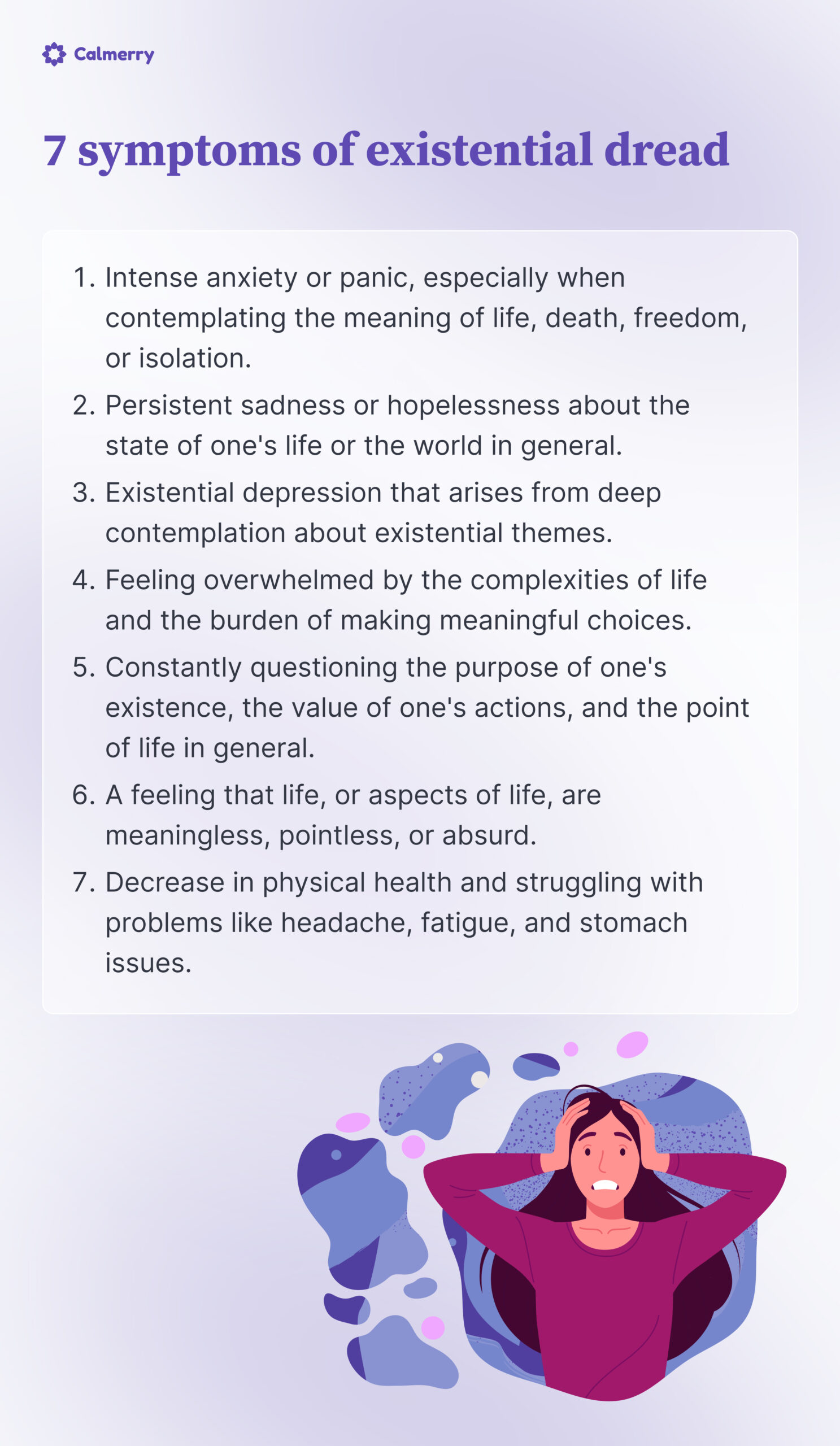Existential Dread: Symptoms, Causes, and Coping

In this article
There comes a time in everyone’s life where we start to question and wonder about the meaning of life. We worry about the future and what our purpose might be.
These existential thoughts put us in the company of history’s famous philosophers and deep thinkers. As a philosophical principle, existentialism assumes that life itself is essentially meaningless and we are responsible for creating our own meaning. [1] Adcox, S. (2022, August 15). What to know about Existential dread. WebMD. https://www.webmd.com/mental-health/what-to-know-existential-dread
That can be a big task – accepting that we are responsible for finding meaning in life. It’s no wonder some people experience anxiety about it.
But while having existential questions are natural, when there is an overwhelming sense of despair and anxiety about these questions, this can result in existential dread.
What is existential dread?
Existential dread, often referred to as existential anxiety, is a feeling of deep anxiety or despair about life’s fundamental questions and the nature of existence. [2] Mph, Z. S. (2022, June 30). What to know about existential anxiety. https://www.medicalnewstoday.com/articles/existential-anxiety#existential-thoughts
– Veronica Silver, Therapist-turned mental health writer
It is not a clinical diagnosis but rather a feeling state. It’s a constant nagging feeling of anxiety related to the meaning of life and the future.
Existential dread is a concept closely related to existentialism, a philosophical movement that emphasizes individual freedom and choice in a world that can often seem absurd and devoid of inherent meaning.
Is existential dread normal?
Yes, experiencing existential dread is a normal part of the human experience for many people.
While it might cause discomfort to question your existence, it can be a natural response to certain life situations.
Significant events like the death of a loved one, a career change, or reaching a significant age milestone can trigger existential thoughts and feelings.
These thoughts and feelings can easily lead to feeling lost in life and trigger the despair of wondering, “Does any of this even matter?”
Feeling existential dread is a normal part of the human condition. It reflects our ability to think deeply about life and our place in the world. It’s a sign of our capacity for self-awareness and introspection.
– Veronica Silver, Therapist-turned mental health writer
Many people actually find that grappling with existential dread leads to personal growth. It can inspire deeper self-reflection, a reevaluation of priorities, and a greater appreciation for life.
Examples of existential dread
Transitions and life events can trigger existential dread. Regardless of whether the changes are positive or negative, significant life events can lead to questions about existence and life’s meaning. Some examples of existential dread include:
- An individual going through a midlife crisis and questioning the choices they’ve made in life.
- A young adult graduating from college or university.
- Someone transitioning to retirement.
- A person entering parenthood.
Existential dread can emerge from various aspects of human life and experience.
Symptoms of existential dread

If you are feeling constant despair and uncertainty about the future and the meaning of life, you are likely experiencing existential dread.
While not a clinical condition, it can manifest through a range of symptoms. These symptoms are typically related to the deep contemplation of life’s big questions and the nature of existence.
Here are some common symptoms of existential dread:
- Intense anxiety or panic, especially when contemplating the meaning of life, death, freedom, or isolation.
- Persistent sadness or hopelessness about the state of one’s life or the world in general.
- Existential depression that arises from deep contemplation about existential themes.
- Feeling overwhelmed by the complexities of life and the burden of making meaningful choices.
- Constantly questioning the purpose of one’s existence, the value of one’s actions, and the point of life in general.
- A feeling that life, or aspects of life, are meaningless, pointless, or absurd.
- Decrease in physical health and struggling with problems like headache, fatigue, and stomach issues. [3] ‘What’s the point?’ How to deal with existential dread. (2020, June 2). Healthline. https://www.healthline.com/health/existential-dread
While existential dread is a part of the human experience, if these feelings become overwhelming or persistent to the point of impairing daily functioning, it may be helpful to seek support from mental health professionals.
– Veronica Silver, Therapist-turned mental health writer
What causes existential dread?
Existential dread has no universal cause. [4] MEd, L. T. (2023, June 23). What is existential dread (And should you manage it)? GoodRx. https://www.goodrx.com/health-topic/mental-health/existential-dread#signs-and-symptoms It can arise from a variety of personal and individual experiences, personalities, and worldviews.
As no two people are alike, what affects one person may not affect another. But there are some occurrences that can cause existential dread, such as becoming aware of your own mortality through the death of a loved one or experiencing a life-threatening situation.
Significant changes in life can also lead to existential dread. This might be entering a new stage of life, graduation, marriage or divorce, retirement, or career changes. Life changes can cause us to question our purpose, what to do next, and lead to anxiety.
Some other causes of existential dread could include:
- Searching for meaning in life, especially in a world that may seem inherently meaningless or indifferent.
- Feeling disconnected from others, whether physically or emotionally, as it may reinforce thoughts about one’s place in the world.
- Exposure to existentialist philosophy or literature, which often delves into themes of meaninglessness, freedom, and isolation.
- Awareness of global crises, such as climate change, pandemics, or political upheaval, can lead to feelings of helplessness and existential anxiety about the future of humanity and the planet.
- Experiencing trauma or severe life stressors can lead to questioning the fairness, meaning, and structure of the world and one’s existence within it.
- Certain mental health issues, like depression or anxiety disorders, can exacerbate or trigger existential dread.
- A tendency towards deep introspection, philosophical thinking, or a heightened sense of awareness can make some individuals more prone to existential dread.
It’s important to remember that existential dread can vary greatly from person to person and can be influenced by a combination of internal and external factors.
While it can be challenging, it can also lead to personal growth and a deeper understanding of oneself and the world.
– Veronica Silver, Therapist-turned mental health writer
Existential dread vs. existential crisis
Existential dread and existential crises are very similar experiences and are often used interchangeably. Both involve experiencing negative thoughts and feelings related to questions of the meaning of life.
However, there are some minor differences between experiencing existential dread versus an existential crisis.
Existential dread is more like a chronic background hum of philosophical anxiety, while an existential crisis is a more life-disrupting phase of questioning and doubt. Both are part of the spectrum of human experience in dealing with existential themes.
– Veronica Silver, Therapist-turned mental health writer
Existential dread
Existential dread is a profound, often lingering sensation of unease or anxiety about life’s fundamental questions.
It typically manifests as a chronic, underlying feeling, rather than an acute state. And it’s deeply rooted in philosophical contemplation about existential themes like life, death, freedom, and the quest for meaning.
Existential dread often presents as a subtle, persistent thought in the back of one’s mind, but it can also intensify depending on your circumstances.
Existential dread can be a long-term presence in your life without necessarily disrupting daily functioning.
Existential crisis
In contrast, an existential crisis represents a more acute and intense period of questioning or confusion about one’s fundamental beliefs, values, and purpose. [5] Gillette, H. (2021, May 20). What’s an existential crisis and how can I overcome it? Psych Central. https://psychcentral.com/lib/existential-crisis-and-dread#whats-an-existential-crisis
Experiencing an existential crisis might result in you questioning, “I don’t know who I am,” rather than wondering about life’s meaning.
An existential crisis often involves a deep questioning of your identity, values, and the authenticity of personal choices. This can lead to a period of profound doubt and upheaval regarding your place in the world.
How long does existential dread last?
How long existential dread lasts can vary from person to person.
For some, existential dread may be a fleeting experience, triggered by specific events or phases of life, and may dissipate as circumstances change or as time passes.
For others, it might be a more persistent part of their worldview or personality. It could linger as an underlying sense of unease about life’s big questions.
Just as no two people have similar mental health journeys, the intensity and duration of existential dread can vary – lasting anywhere from a few days to several years.
There are a variety of things that can affect how long you might experience existential dread, including having strong and effective coping skills and support. Those who engage in meaningful activities and seek support might find their periods of existential dread are shorter and less intense.
What age does existential dread start?
Existential dread can occur at any stage in life depending on your situation and circumstances. Some people may never experience existential dread, while others may struggle with it at every transition in life.
Many people begin to experience existential dread during adolescence or young adulthood. This is a time when individuals start to think more deeply about their identity, the future, and the nature of the world.
The cognitive developments of this stage enable more abstract thinking, allowing for deeper contemplation of existential themes.
The adult version of existential dread, or crisis, often begins around mid to late 20’s due to transitions from young adulthood to more adult responsibilities. [6] Andrews, M. E. (2016). The existential crisis. The Behavioral Development Bulletin, 21(1), 104–109. https://doi.org/10.1037/bdb0000014 Many people around this age are graduating from college and seeking stable employment.
This is also a period where societal expectations of having a house and starting a family become more prevalent. All these changes and expectations can cause people to start questioning their purpose and meaning in life.
The period of mid-life, around ages 40 to 60, can prompt reflections on mortality, accomplishments, unfulfilled dreams, and the remaining years of life. While in older adulthood, existential dread can emerge as individuals confront issues related to aging, the meaning of their life’s work, and the inevitability of death.
For most people, it’s not about at what age existential dread will start, but rather the circumstances in each individual’s life.
Does existential dread go away?
There is no “yes or no” answer to whether existential dread will go away.
Whether or not it goes away can depend on a variety of factors including your coping mechanisms, life circumstances, and personal growth.
While existential dread may not completely go away for everyone, it can become more manageable through personal development, coping strategies, and professional guidance.
– Veronica Silver, Therapist-turned mental health writer
How to deal with existential dread
Your experience with existential dread may not go away, but there are strategies to manage and lessen the anxiety and despair associated with these thoughts.
Dealing with existential dread involves a combination of practical strategies and professional support.
Here are some effective ways to manage and cope with these feelings:
1. Developing a sense of purpose
Finding and pursuing activities that give you a sense of purpose can reduce feelings of existential dread. This might involve career goals, hobbies, creative pursuits, or volunteering.
2. Building connections
Strengthening relationships with family, friends, or communities can provide a sense of belonging and support. Sharing thoughts and feelings with trusted individuals can lessen the burden of existential dread.
3. Mindfulness and meditation
Practices like mindfulness and meditation can help in staying grounded in the present moment, reducing anxiety about existential concerns that are often future-oriented or abstract. [7] Sakai, A., Terao, T., Kawano, N., Akase, M., Hatano, K., Shirahama, M., Hirakawa, H., Kohno, K., Inoue, A., & Ishii, N. (2019). Existential and Mindfulness–Based Intervention to Increase Self-Compassion in Apparently Healthy Subjects (the EXMIND Study): A Randomized Controlled Trial. Frontiers in Psychiatry, 10. https://doi.org/10.3389/fpsyt.2019.00538
4. Acceptance and embracing uncertainty
Learning to accept the uncertainties of life and embracing them as a natural part of the human experience can reduce the anxiety associated with existential dread.
You might have to work on getting comfortable with not knowing and learn to embrace the uncertainty.
5. Reflecting on achievements and gratitude
Focusing on personal achievements, no matter how small, and practicing gratitude can shift the focus from existential worries to positive aspects of life. [8] Harvard Health. (2021, August 14). Giving thanks can make you happier. https://www.health.harvard.edu/healthbeat/giving-thanks-can-make-you-happier
6. Setting realistic goals
Setting achievable and meaningful goals can provide a sense of direction and accomplishment, countering feelings of pointlessness or aimlessness.
Remember, dealing with existential dread is about finding the right combination of strategies that resonate with your individual needs and perspectives.
Seeking professional mental health support
If existential dread becomes overwhelming, consulting a mental health professional or getting therapy for anxiety can be beneficial.
Therapists can help in exploring these feelings in a safe environment and provide coping strategies tailored to individual needs.
There are a variety of options for professional support, including online therapy for more accessibility and flexibility.
A word from Calmerry
You’re not alone in this search for meaning.
Our licensed therapists at Calmerry are here to provide a compassionate, supportive space where you can explore these deep questions.
Together, you can work on strategies that help you find personal significance in the day-to-day, turning existential dread into a source of empowerment and self-discovery.
Start with a brief survey – and get matched with your professional within 1 hour.
Adcox, S. (2022, August 15). What to know about Existential dread. WebMD. https://www.webmd.com/mental-health/what-to-know-existential-dread
Mph, Z. S. (2022, June 30). What to know about existential anxiety. https://www.medicalnewstoday.com/articles/existential-anxiety#existential-thoughts
‘What’s the point?’ How to deal with existential dread. (2020, June 2). Healthline. https://www.healthline.com/health/existential-dread
MEd, L. T. (2023, June 23). What is existential dread (And should you manage it)? GoodRx. https://www.goodrx.com/health-topic/mental-health/existential-dread#signs-and-symptoms
Gillette, H. (2021, May 20). What’s an existential crisis and how can I overcome it? Psych Central. https://psychcentral.com/lib/existential-crisis-and-dread#whats-an-existential-crisis
Andrews, M. E. (2016). The existential crisis. The Behavioral Development Bulletin, 21(1), 104–109. https://doi.org/10.1037/bdb0000014
Sakai, A., Terao, T., Kawano, N., Akase, M., Hatano, K., Shirahama, M., Hirakawa, H., Kohno, K., Inoue, A., & Ishii, N. (2019). Existential and Mindfulness–Based Intervention to Increase Self-Compassion in Apparently Healthy Subjects (the EXMIND Study): A Randomized Controlled Trial. Frontiers in Psychiatry, 10. https://doi.org/10.3389/fpsyt.2019.00538
Harvard Health. (2021, August 14). Giving thanks can make you happier. https://www.health.harvard.edu/healthbeat/giving-thanks-can-make-you-happier
online therapy
live video session



